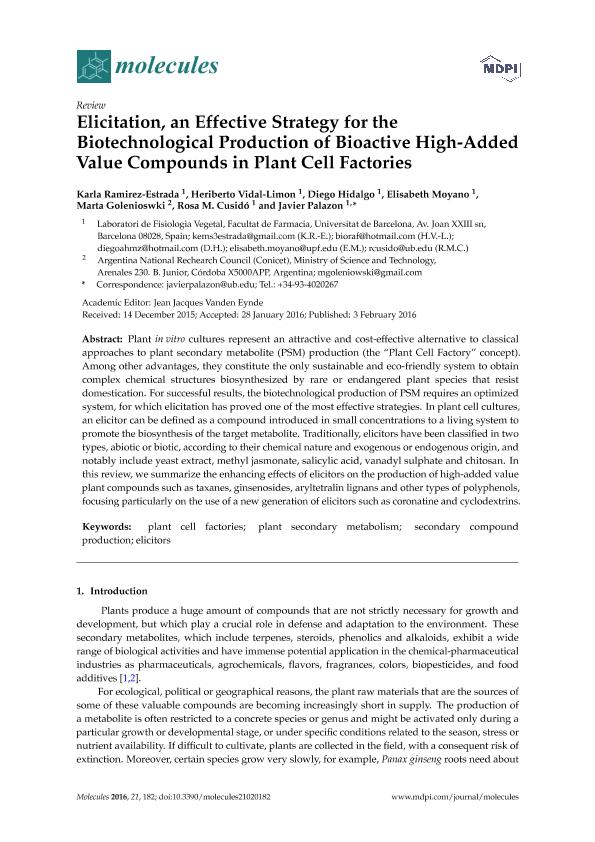Mostrar el registro sencillo del ítem
dc.contributor.author
Ramirez Estrada, Karla
dc.contributor.author
Vidal Limon, Heriberto
dc.contributor.author
Hidalgo, Diego
dc.contributor.author
Moyano, Elisabeth
dc.contributor.author
Goleniowski, Marta Ester

dc.contributor.author
Cusidó, Rosa M.
dc.contributor.author
Palazon, Javier
dc.date.available
2019-03-13T20:55:17Z
dc.date.issued
2016-02
dc.identifier.citation
Ramirez Estrada, Karla; Vidal Limon, Heriberto; Hidalgo, Diego; Moyano, Elisabeth; Goleniowski, Marta Ester; et al.; Elicitation, an effective strategy for the biotechnological production of bioactive high-added value compounds in plant cell factories; Molecular Diversity Preservation International; Molecules; 21; 2; 2-2016; 1-24; 182
dc.identifier.issn
1420-3049
dc.identifier.uri
http://hdl.handle.net/11336/71584
dc.description.abstract
Plant in vitro cultures represent an attractive and cost-effective alternative to classical approaches to plant secondary metabolite (PSM) production (the "Plant Cell Factory" concept). Among other advantages, they constitute the only sustainable and eco-friendly system to obtain complex chemical structures biosynthesized by rare or endangered plant species that resist domestication. For successful results, the biotechnological production of PSM requires an optimized system, for which elicitation has proved one of the most effective strategies. In plant cell cultures, an elicitor can be defined as a compound introduced in small concentrations to a living system to promote the biosynthesis of the target metabolite. Traditionally, elicitors have been classified in two types, abiotic or biotic, according to their chemical nature and exogenous or endogenous origin, and notably include yeast extract, methyl jasmonate, salicylic acid, vanadyl sulphate and chitosan. In this review, we summarize the enhancing effects of elicitors on the production of high-added value plant compounds such as taxanes, ginsenosides, aryltetralin lignans and other types of polyphenols, focusing particularly on the use of a new generation of elicitors such as coronatine and cyclodextrins.
dc.format
application/pdf
dc.language.iso
eng
dc.publisher
Molecular Diversity Preservation International

dc.rights
info:eu-repo/semantics/openAccess
dc.rights.uri
https://creativecommons.org/licenses/by-nc-sa/2.5/ar/
dc.subject
Elicitors
dc.subject
Plant Cell Factories
dc.subject
Plant Secondary Metabolism
dc.subject
Secondary Compound Production
dc.subject.classification
Bioremediación, Diagnóstico Biotecnológico en Gestión Medioambiental

dc.subject.classification
Biotecnología del Medio Ambiente

dc.subject.classification
INGENIERÍAS Y TECNOLOGÍAS

dc.title
Elicitation, an effective strategy for the biotechnological production of bioactive high-added value compounds in plant cell factories
dc.type
info:eu-repo/semantics/article
dc.type
info:ar-repo/semantics/artículo
dc.type
info:eu-repo/semantics/publishedVersion
dc.date.updated
2019-03-13T17:41:06Z
dc.journal.volume
21
dc.journal.number
2
dc.journal.pagination
1-24; 182
dc.journal.pais
Suiza

dc.journal.ciudad
Basel
dc.description.fil
Fil: Ramirez Estrada, Karla. Universidad de Barcelona; España
dc.description.fil
Fil: Vidal Limon, Heriberto. Universidad de Barcelona; España
dc.description.fil
Fil: Hidalgo, Diego. Universidad de Barcelona; España
dc.description.fil
Fil: Moyano, Elisabeth. Universidad de Barcelona; España
dc.description.fil
Fil: Goleniowski, Marta Ester. Consejo Nacional de Investigaciones Científicas y Técnicas; Argentina
dc.description.fil
Fil: Cusidó, Rosa M.. Universidad de Barcelona; España
dc.description.fil
Fil: Palazon, Javier. Universidad de Barcelona; España
dc.journal.title
Molecules

dc.relation.alternativeid
info:eu-repo/semantics/altIdentifier/doi/http://dx.doi.org/10.3390/molecules21020182
dc.relation.alternativeid
info:eu-repo/semantics/altIdentifier/url/https://www.mdpi.com/1420-3049/21/2/182
Archivos asociados
